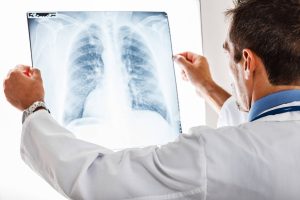
2024-07-12T16:54:51
Sunscreen Travel Tips
- Dermatology
November 29, 2021 | Cancer Center • Pulmonology

Lung cancer is the leading cause of cancer deaths around the world. While 80% of lung cancer deaths are caused by smoking, lung cancer can occur in people who have never smoked or had exposure to secondhand smoke. About 20,000 to 40,000 people who have never smoked or smoked fewer than 100 cigarettes in their lifetime contract varying types of lung cancers.
Lung Cancer symptoms are generally the same for every patient, whether you have smoked or not. Some common symptoms include:
Most people with lung cancer either formerly smoked or were exposed to secondhand smoke over a long time. While it is rare for someone who has never smoked to contract the disease, it can still happen. Several factors can increase the risk of lung cancer. Some of these factors can be controlled, such as quitting smoking. However, other factors cannot be controlled like your family history and air pollution. Some of the most common risk factors for lung cancer include:

Daniel Boffa, MD, a Yale Medicine thoracic surgeon, offers a helpful way to visualize the difference between cancers that affect smokers and cancers that affect nonsmokers. He says,
If you are a smoker, you can think of your lung as a bag of white marbles, and cancer is like putting a black marble in there. The type of cancer a nonsmoker gets is more like putting in black sand. Instead of a spot or a lump, it’s more like a hazy area. It’s more diffuse.
If you are experiencing any of the symptoms listed above or have been introduced to high levels of radon or asbestos, contact your primary care physician. If you have already faced cancer but are still experiencing symptoms, your oncologist can work with you to develop a healthcare plan. Part of that plan may include PET-CT scans that can check for signs of cancer recurrence. For more information regarding the benefits and risks of PET-CT scans, visit the Revere Health blog.
If you are in need of any care related to your respiratory system, the Revere Health Pulmonology team will be happy to assist you.

WRITTEN BY:
Lindsey LeBaron
Lindsey LeBaron has been working as the Marketing Assistant for Revere Health for the past three years. Lindsey has a bachelor’s degree in social sciences at Brigham Young University and will graduate with her master’s degree in global strategic communications at Florida International University in December 2021. Coupled with her master’s degree, Lindsey is also working on a certification in crisis management and consensus-building. Recently, she was awarded the honor of joining the National Communications Association as a member of the Lambda Pi Eta honor society. Lindsey is passionate about building lasting connections between communities to create lasting change and believes that communication is a vital element to building long-lasting relationships. When she is out of the office, Lindsey enjoys singing and playing the piano, going on adventures, traveling to new locations, and reading books about world affairs.


2024-07-12T16:54:51

2024-07-02T11:42:04

2024-07-01T13:49:28

2024-06-21T14:29:51
This information is not intended to replace the advice of a medical professional. You should always consult your doctor before making decisions about your health.